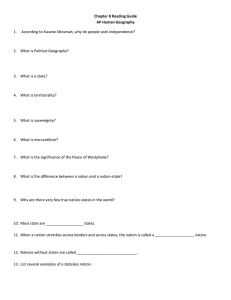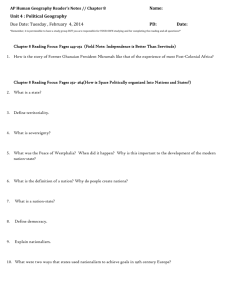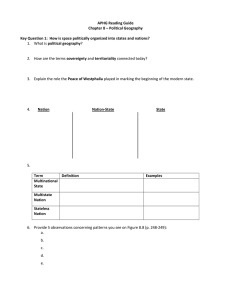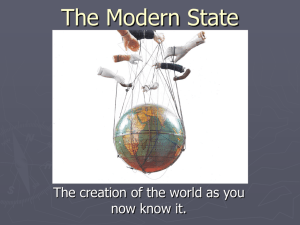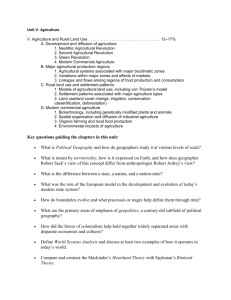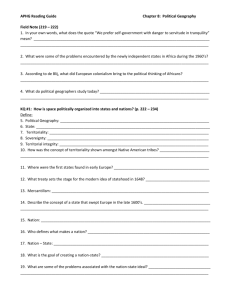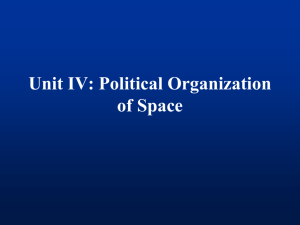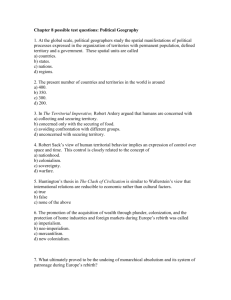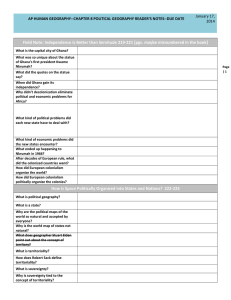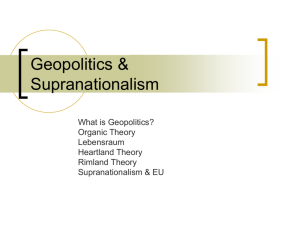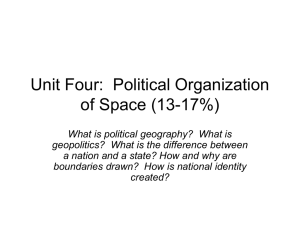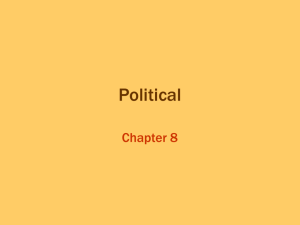Guided Reading 8-2 - Magnolia High School
advertisement
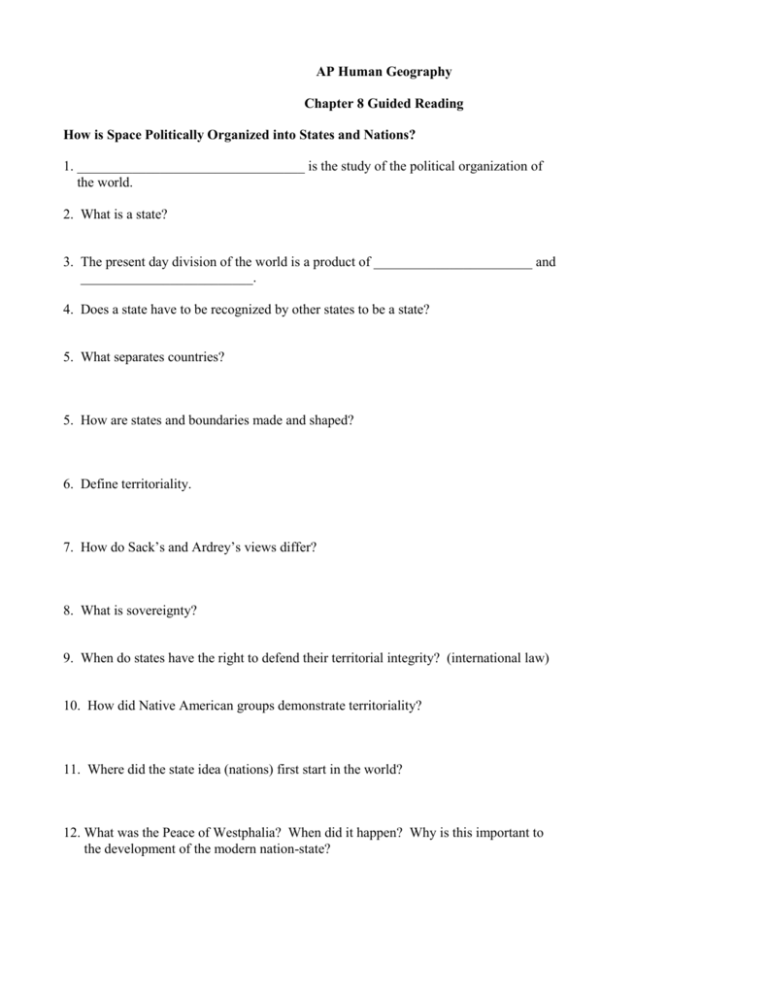
AP Human Geography Chapter 8 Guided Reading How is Space Politically Organized into States and Nations? 1. _________________________________ is the study of the political organization of the world. 2. What is a state? 3. The present day division of the world is a product of _______________________ and _________________________. 4. Does a state have to be recognized by other states to be a state? 5. What separates countries? 5. How are states and boundaries made and shaped? 6. Define territoriality. 7. How do Sack’s and Ardrey’s views differ? 8. What is sovereignty? 9. When do states have the right to defend their territorial integrity? (international law) 10. How did Native American groups demonstrate territoriality? 11. Where did the state idea (nations) first start in the world? 12. What was the Peace of Westphalia? When did it happen? Why is this important to the development of the modern nation-state? 13 What was mercantilism? How did this help to develop the nation-state? 14. What is a nation? (NOT a country.) 15. Why do people create nations? 16. What is a nation-state? 17. Define democracy. 18. What is the key problem of the nation-state? 19. Why is this a problem? 20. Explain nationalism. 21. What were two ways that states used nationalism to achieve goals in 19th century Europe? 22. How do states help people within their borders relate to the nation that meshes within the borders of the state? 23. Explain what a multinational state is. 24. What nations were within the former Yugoslavia? (This lead to war and the breakup of Yugoslavia.) 25. Explain what a multistate nation is. 26. Describe a stateless nation. Give an example of a group who are a stateless nation today. 27. Define colonialism 28. What countries were involved in the first wave of colonialism? (6 countries) 29. Who were the major countries involved in the 2nd wave of colonialism? 30. What continent was divided by European powers at the Berlin Conference? When was the Berlin Conference? 31. How did the nation-state model for countries diffuse around the world? 33. Is wealth evenly distributed in the world economy? 34. According to Wallerstein world-systems theory views the world as much more than _______________. 35. What are Wallerstein’s three basic tenets (ideas) of World Systems Theory? 1. 2. 3. 36. What is capitalism? 37. What is commodification? 38. World systems theorists see the world economy as a __________________ _________________ _______________________. 39. The core and the periphery are not just places, but _________________________. 40. Describe core processes. 42. Describe periphery processes. 43. What happens in the semi-periphery? How do States Spatially Organize Their Governments? 44. Hartshorne described two forces within the state. One unifies people and one divides people. What are these two forces? 45. What determines whether or not a nation or a state will continue to exist? 46. Using the above information, explain what war can do to a state. 47. Two governmental structures commonly found in the world today are ________________ and ____________________________. 48. What does it mean to “suppress dissent by forceful means”? 49. Describe a unitary government. 50. What is a centralized government? 51. What is the administrative framework of a unitary government supposed to do? 52. Describe a federal system of government. 53. Describe a strong federal system and a weak federal system. 54. Describe the judicial system of Nigeria. What do you think about this? (Be specific.) 55. Does the federal system allow for accommodations of regional differences? Give an example of this in the United States. 56. Explain devolution. Give a specific example. 57. What caused many of Europe’s devolutionary movements? 58. How did Czechoslovakia experience devolutionary forces? 59. How is Sri Lanka experiencing devolutionary forces? 60. What two parts of the United Kingdom where given the opportunity to vote for devolution? What happened? 61. Give an example of an economic devolutionary force. (Look at the pictures for ideas.) 62. What regions are most likely to seek devolution? What state in the United States is most serious about devolution? How are Boundaries Established, and Why do Boundary Disputes Occur? 1. What do electoral geographers do? 2. What part of U.S. government establishes a system of territorial representation? 3. Why do we have a census every 10 years? What happens if population shifts are noticed in the census? 4. What is a majority-minority district? 5. Where did the term gerrymandering come from? What is gerrymandering and how is it used? 6. A boundary between states is a ____________________________________________________________________________________________ ________________________________________________________________ 7. What dispute did Belgium, The Netherlands, and Germany have over an underground resource? What was not accurate at the time to help to end this dispute? 8. What was a major issue between Iraq and Kuwait which led to Iraq’s invasion of Kuwait in 1990? What did the Iraqi’s say that the Kuwaiti’s where allegedly doing that violated Iraq’s underground border? 9. What is a state’s airspace? 10. What are the four steps involved in establishing a boundary? 11. What are geometric boundaries? How were boundary lines established at the Berlin Conference? 12. What are some problems with using physical features as boundary lines? 13. The stability of boundaries has more to do with __________________________________________________________________________________________ than with the character of the boundary itself. 14. What are 3 problems that can arise from written descriptions of boundaries? 15. What are 4 principal forms of boundary disputes? 16. Describe each of the forms of boundary disputes. How do Geopolitics and Critical Geopolitics Help Us Understand the World? 17. Define the term geopolitics. 18. Why is it important to understand geopolitics? 19. What are the two schools of classical geopolitics? Describe them. 20. What did Ratzel say about why states become powerful? 21. Who used Ratzel’s theories to justify territorial expansion in the 1930’s? 22. Who was Mackinder? What did he name the pivot area? 23. Describe the Heartland Theory. 24. Why was NATO formed? 25. Why did geopolitics gain a negative connotation after WWII? 26. What is the basic concept behind critical geopolitics? 27. How did President Ronald Reagan describe the Soviet Union and the United States? How does this reflect critical geopolitics? 28. What did President Bush say about terrorism in 2002? How does this reflect critical geopolitics? 29. Describe what is meant by geopolitical world order. 30. Why did the world enter a transition period in 1991? What happened that ended the age of the 2 superpowers? 31. Who drove Iraq out of Kuwait in 1991? Why is it important that Russia sided with the United Nations? 32. What is unilateralism and who is in a position of hard power dominance? What are Supranational Organizations, and What is the Future of the State? 33. Explain what a supranational organization is. 34. What did Woodrow Wilson propose after WWI? What happened as a result? 35. Why was #34 formed? 36. When did #34 fall apart? 37. Why was the Permanent Court of International Justice formed? 38. What supranational organization was formed after WWII? 39. As of the printing of this book, how many states are members? 40. What are three important subsidiaries of the U.N.? 41. What organizations of the U.N. have done important work in human rights? 42. What can violations of internationally approved standards of behavior lead to? What are some examples of this? 43. What did Belgium, the Netherlands, and Luxembourg create? Why did they make this agreement of cooperation? 44. Why was the European Union established in 1992? What is the name of the single currency the EU established? What do they call the region where this money is used? 45. Under the rules of the EU the _________________________ countries must ____________________ the poorer ones… (subsidies are forms of financial assistance) 46. What state in the EU is currently the most economically powerful? 47. What are the problems with Turkey joining the EU? 48. Why is economic supranationalism so important? 49. Why did the U.N. dismantle Iraq’s nuclear capacity after the 1991 Gulf War?
